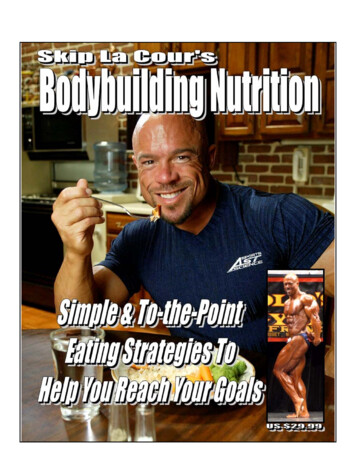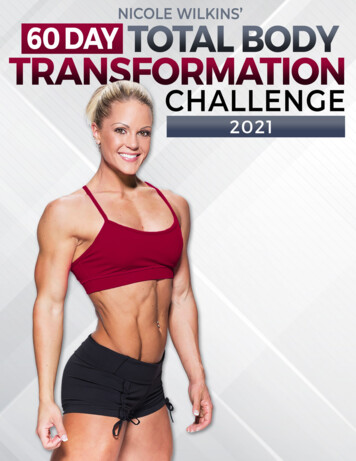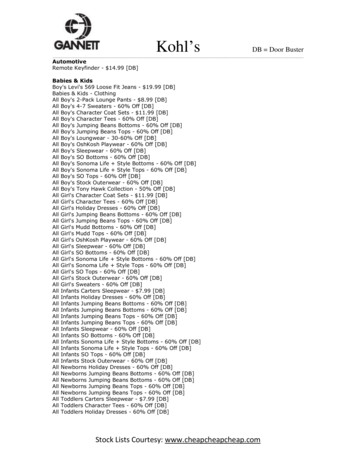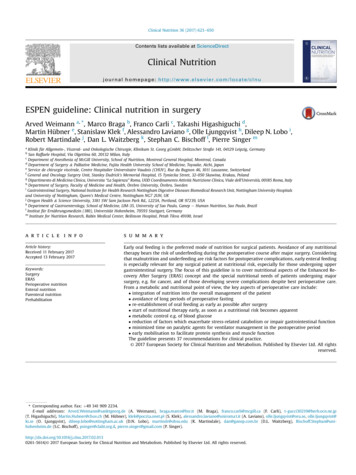
Transcription
Oftentimes in life, it’s not what we know—it’s actuallyfollowing through and doing what we already know.—Skip La Cour
Bodybuilding NutritionSimple & To-the-Point Eating Strategies To Help YouReach Your GoalsTable of ContentsThe Importance Of Good Nutrition . . . . . . . . . . . . . . . . . . . . . . . . . . . . . . . . . . . .2Good Eating Habits Are Built Upon A Foundation Of Motivation . . . . . . . . . . . . .2The Three Most Important Keys To Understanding Effective BodybuildingNutrition . . . . . . . . . . . . . . . . . . . . . . . . . . . . . . . . . . . . . . . . . . . . . . . . . . . . . . . .4The Macronutrients And What They Do For Us -- Protein, Carbohydrates AndFat Explained . . . . . . . . . . . . . . . . . . . . . . . . . . . . . . . . . . . . . . . . . . . . . . . . . . . .5The “Right” Ratio Of Macronutrtients. . . . . . . . . . . . . . . . . . . . . . . . . . . . . . . . . . 8Determining How Many Calories You Should Eat. . . . . . . . . . . . . . . . . . . . . . . . .9Skip La Cour’s Simple Way To Determine Your Maintenance Level. . . . . . . . . 11Body Composition. . . . . . . . . . . . . . . . . . . . . . . . . . . . . . . . . . . . . . . . . . . . . . . .16Determining How Many Meals To Eat Each Day . . . . . . . . . . . . . . . . . . . . . . . .17Skip La Cour’s Basic Meal Plan. . . . . . . . . . . . . . . . . . . . . . . . . . . . . . . . . . . . . 19Eating To Build Muscle Mass. . . . . . . . . . . . . . . . . . . . . . . . . . . . . . . . . . . . . . .20How To Calculate The Percentages Of Macrocnutrients In Your Food – A QuickNutrition Mathematics Review . . . . . . . . . . . . . . . . . . . . . . . . . . . . . . . . . . . . . .20The Importance Of Protein. . . . . . . . . . . . . . . . . . . . . . . . . . . . . . . . . . . . . . . . .22How Much Protein You Should Eat To Build Muscle. . . . . . . . . . . . . . . . . . . . . 23Skip La Cour Explains His “Protein Consumption Window Of Opportunity”Theory. . . . . . . . . . . . . . . . . . . . . . . . . . . . . . . . . . . . . . . . . . . . . . . . . . . . . . . . .25The Danger Of Eating Too Much Protein. . . . . . . . . . . . . . . . . . . . . . . . . . . . . . 26The “Bulking Up” Strategy For Packing On Muscle Mass. . . . . . . . . . . . . . . . . .27Eating To Lose Body Fat. . . . . . . . . . . . . . . . . . . . . . . . . . . . . . . . . . . . . . . . . . .29
There’s No Substitute For Hard Work When It Comes To Losing Body Fat. . . . . . . . . . . . . . . . . . . . . . . . . . . . . . . . . . . . . . . . . . . . . . . . . . . . . . . . . . . . . . . . . . . 31Why Starchy Carbohydrates May Not Be As Good For You As You Think. . . . . . . . . . . . . . . . . . . . . . . . . . . . . . . . . . . . . . . . . . . . . . . . . . . . . . . . . . . . . . . . . . . . 32Building Muscle And Losing Body Fat At The Same Time. . . . . . . . . . . . . . . . . 34Dealing With The Challenge Of A Slow Metabolism. . . . . . . . . . . . . . . . . . . . . .35Dealing With The Challenge Of A Fast Metabolism. . . . . . . . . . . . . . . . . . . . . . 37Why You Should Keep Your Diet Simple. . . . . . . . . . . . . . . . . . . . . . . . . . . . . . 38The Benefits Of Adding “Good” Fat To Your Diet And The Painful Lesson ILearned! . . . . . . . . . . . . . . . . . . . . . . . . . . . . . . . . . . . . . . . . . . . . . . . . . . . . . . .41Skip La Cour’s First 5 To 6 Months Of Dieting The Year He Won The NPC TeamUniverse . . . . . . . . . . . . . . . . . . . . . . . . . . . . . . . . . . . . . . . . . . . . . . . . . . . . . . .43Skip La Cour’s Last 10 To 12 Weeks Of Dieting The Year He Won The NPCTeam Universe . . . . . . . . . . . . . . . . . . . . . . . . . . . . . . . . . . . . . . . . . . . . . . . . . .44Skip La Cour’s New And Improved “Good Fat” Diet. . . . . . . . . . . . . . . . . . . . . . 47The Importance Of Drinking Plenty Of Water. . . . . . . . . . . . . . . . . . . . . . . . . . . 48Skip La Cour’s Tip For Drinking More Water. . . . . . . . . . . . . . . . . . . . . . . . . . . .50The Benefits Of Adding Salt To Your Meals . . . . . . . . . . . . . . . . . . . . . . . . . . . 49Getting Shredded And Maintaining Muscle Is A Matter Of Heart. . . . . . . . . . . . 51Once You’ve Missed A Scheduled Meal—It’s Gone Forever! . . . . . . . . . . . . . . 52Fat-Burning Mode: Learn To Love That Feeling . . . . . . . . . . . . . . . . . . . . . . . . 52How Do You Know That You’re Losing Muscle? . . . . . . . . . . . . . . . . . . . . . . . . 53Incorporating “Cheat Days” Into Your Disciplined Diet Without Feeling Guilty. . . . . . . . . . . . . . . . . . . . . . . . . . . . . . . . . . . . . . . . . . . . . . . . . . . . . . . . . . . . . . . . . 54The Bodybuilding Triad: A Visual Demonstration Of The Importance Of Nutrition. . . . . . . . . . . . . . . . . . . . . . . . . . . . . . . . . . . . . . . . . . . . . . . . . . . . . . . . . . . . . . 54
Skip La Cour’s Top Ten Nutrition Tips. . . . . . . . . . . . . . . . . . . . . . . . . . . . . . . . 55Samples Of Skip La Cour’s Nutritional Programs. . . . . . . . . . . . . . . . . . . . . . . .58Skip La Cour’s Ten Tips For Eating Well Despite Your Busy Schedule. . . . . . . 6510 Keys to Creating an Effective Nutritional Plan . . . . . . . . . . . . . . . . . . . . . . . 69About Skip La Cour . . . . . . . . . . . . . . . . . . . . . . . . . . . . . . . . . . . . . . . . . . . . . . 87
Skip La CourBodybuilding NutritionSimple & To-the-Point Eating Strategies To Help You Reach YourGoalsBy Skip La CourNPC Team Universe & Musclemania ChampionIbelieve many of us make the process of bodybuildingfar more complicated than it needs to be. This isespecially true when it comes to nutrition.I’ve come to this conclusion after answering literallythousands of questions from bodybuilders for more thana decade. Through seminars, appearances, letters,phone consultations, and contact through the Internet,the same questions we’re asked and the same challenges were encounteredover and over again. It didn’t matter what level of experience, number ofaccomplishments, individual circumstances, or what part of the world abodybuilder lived, when it comes to nutrition, our patterns of thinking and theobstacles they faced were basically the same.As I strive to strengthen my skills as an effective bodybuilding coach, one of mygoals is to simplify the bodybuilding process. The bottom line is that we are allafter the same things; to build muscle, lose body fat, or a combination of buildingmuscle and losing body fat. We also want to do so in the most efficient ways andin the shortest period of time.If you embrace the nutritional strategies I’ve outlined in this publication, how youneed to build muscle and lose body fat will be more simple. Notice the word Iused was simple—not easy! Nothing is easy (Nothing worth having, anyway).Eating to create a lean and muscular physique is no exception.1
Bodybuilding NutritionThe Importance of Good Nutritionf you want to produce high-quality muscleIand maintain lower body fat levels fromthe time and effort you invest in training,you must feed yourself properly. Yournutritional habits—not how you train in thegym—has the greatest impact on thedevelopment of your physique. Many expertsfeel the way you eat accounts for as much as80 percent of the way you look. If you wantan impressive muscular body, you are goingto have to pay close attention to what you areeating.In fact, if I was faced with the dilemma ofchoosing between training or eating properly as my only vehicle to look and feelmy very best, I would choose to eat properly. Sound nutrition is that important toyour bodybuilding efforts. A heavy emphasis needs to be placed on studyingwinning nutritional strategies and executing those strategies on a consistentbasis.Good Eating Habits Are Built Upon A Foundation Of Motivation“I’m so confused about nutrition!” many bodybuilders often complain. “My trainingis great but, when it comes to how I should eat, I don’t have a clue!”Good eating habits are built upon a foundation of motivation. Let’s get honestwith ourselves for a moment. Is the difficulty in this particular situation inunderstanding nutrition? Or, is the real challenge following through with eatingthe way we already know we should?2
Skip La CourLet’s admit what’s really going on in some ofour minds. Eating delicious foods is one oflife’s simplest, easiest-to-attain, and greatestpleasures. Sometimes, it’s very difficult tostay away from food that doesn’t support ourbodybuilding efforts. Great-tasting butunhealthy food becomes too much of atemptation for us. Even when we arecommitted to eating properly, it’s sometimestoo difficult to break away from our busyschedules and eat our meals at all—whetherthey are good for us or not.The key to eating to build muscle comesdown to being properly motivated to do so. Because you are taking the time toread this nutritional advice, I assume you’re pretty motivated. This is a great timeto determine exactly why today is the day you’ll make the commitment to earnthe physique you really want by eating right. If you know why you want to dosomething, figuring out how to do it will become much easier. You must first takecare of figuring out why and, hopefully, my advice will help you figure out how tomeet your physique-enhancing goals.Eating to build muscle and lose body fat is a way of thinking just as much as it isa series of actions. Many bodybuilders get easily confused, frustrated, andeventually overwhelmed with the subject of proper nutrition. Rock-solidbodybuilding nutrition doesn’t need to be complicated in order to be effective.3
Bodybuilding NutritionThe Three Most Important Keys To Understanding EffectiveBodybuilding NutritionLet’s break down and simplify this important aspect of bodybuilding. Youbasically need to understand three things about nutrition:1. The main purpose for each of the three macronutrients: Protein,carbohydrates, and fat2. The “right” ratio, or the “correct” percentages, of protein,carbohydrates, and fat that your food should be divided into in order tomeet your bodybuilding goals3. The number of calories you should consume to meet your specificphysique-enhancement goalsGood nutrition seems much easier when it is brokendown and you look it at from that perspective, doesn’tit? But what do the three macronutrients do for ourbodies? What ratio of our food should be allocated toprotein, carbohydrates, and fat? How do I determinehow many calories I should eat? I’ll answer thosequestions—and a whole lot more.Those questions about nutrition provide a wide rangeof answers that are not necessarily easy to find. But,with experimentation, patience, and persistence, you’lleventually figure out what’s best to help you reachyour personal goals. Unfortunately, there are no easier ways around this fact.There are no magic numbers, solutions, or formulas that I, nor anyone else, cangive you to make the process effortless—no matter what you are told. These4
Skip La Couranswers not only vary from person to person, they also can vary within the verysame person during different periods of time.The Macronutrients and What They Do For Usith simplicity and efficiency inWmind, let’s discuss themacronutrients. In generalterms, all food is broken downinto three major groups ofmacronutrients; protein, carbohydrates,and fat. Here is a simple explanation ofwhat they are and what each of them dofor our bodies:ProteinProtein, far and away, is the most important nutrient you’ll need to build muscleon your body. Muscle is protein. Protein is muscle. Without enough protein, you’llhave a very difficult time seeing results from your training. Plain and simple,you’re simply not going to grow muscle without a sufficient amount of protein.CarbohydratesCarbohydrates give you the energy to train hard in the gym and carry out youreveryday activities. Your body needs carbohydrates on a consistent basisthroughout the day to feed the brain that uses glucose, or blood sugar, as itsprimary energy source. Glucose is a carbohydrate used by every cell in the bodyas fuel.5
Bodybuilding NutritionWhen carbohydrates stored in the body are depleted too far, the body willconvert precious muscle-building protein into glucose instead of regularcarbohydrates to give the body the energy it needs. As a bodybuilder, you wantto do everything you possibly can to avoid this from occurring. The very last thingyou want is to have your hard-earned muscle mass sacrificed for energy.Consuming enough carbohydrates will prevent this from happening.Excess carbohydrates, however, will beconverted into fat. How can you avoid eatingtoo many carbohydrates? I was once offered asuggestion I found to be very helpful. Thestrategy was to eat the majority ofcarbohydrates in the morning and immediatelyafter working out. These are ideal times for thebody to process carbohydrates more rapidly.Rice and Cream of Rice are my favoritesources of carbohydratesSome people believe you should limit your carbohydrate consumption after 6 or 7p.m. They believe carbohydrates are converted to body fat much easier at thattime because of your body’s ability to burn fat is reduced while sleeping. Othershave a different opinion. They believe it doesn’t matter when you eat yourcarbohydrates. The body processes carbohydrates the same all the time.Personally, I agree with the latter opinion. Carbohydrates in the morning,carbohydrates in the evening, or carbohydrates in the afternoon, in my opinion, itultimately doesn't matter when you eat them. What is important is, at the end ofthe day, the calories that you’ve burned are greater than the calories you’veconsumed. In my experience, as I have prepared for a bodybuilding contest thatI’ve appeared in very good condition, I’ve eaten many complex carbohydratedense meals right before I’ve gone to sleep and I would get harder and harder.6
Skip La CourHow do you determine the “right” amount of carbohydrates you should eat? Idecide the amount of carbohydrates I’ll eat this way:As a bodybuilder, I will always keep my protein intake high to build muscle(usually, this is about 400 grams a day). If I’m trying to get lean or stayi lean, I willclosely monitor the fat in my diet (usually, this will be limited to the incidental fatthat comes in my lean meat and carbohydrates). I also realize I must stay withina certain calorie range to meet my personal goals. What's left to consider? Onlycarbohydrates are left to consider. I eat enough carbohydrates to give me justenough energy to train heavy and with intensity, have enough energy to do myregular life’s activities, and to manage my body fat level—and not many morecarbohydrates than that. After I total the calories from my essential protein andincidental fat, the calories coming from carbohydrates can’t cause me to exceedthe total calories I’ve allotted myself for the day. The calories derived fromcarbohydrates must “sandwich” in between.FatsFat in your diet serves a vital purpose for the body. Fat acts as a structuralcomponent for all cell membranes and supplies necessary chemical substratesfor hormonal production. Fat protects vital organs and carries fat-solublevitamins.Your body needs fat—so don’t try to avoid it completely. Many experts feel that26-30 percent of your total dietary calories should come from fat.There are two types of fat. Saturated fat, which is considered bad fat, andunsaturated, which is considered to be good fat. Some people add fat like oliveoil and canola oil to their diets to make sure they meet their body’s requirements.7
Bodybuilding NutritionWhat Is The “Right” Ratio of Macronutrtients?Let start off by saying there’s is no “right” answer. The recommended ratio, ofprotein, carbohydrates, and fat to effectively build muscle and lose body fat isoften debated by the experts in the health and fitness community. The amountyou need is based on your own body’s ability to metabolize nutrients and on yourparticular fitness goals. Again, experimentation is needed on your part here.Don’t get overwhelmed by trying to nail down an exact percentage! In the bigpicture, in other words, over the course of time a 10 percent difference or swingin a couple of the three macronutrients is really not a big deal—especially if itcauses you to procrastinate from jumping and starting your diet! If you are trulycommitted, you will have plenty of time to make adjustments if you pay closeattention to your body.This is how I keep it simple in my mind:As a bodybuilder, I must eat moreprotein than an average person. Mysecondary focus is consuming enoughcarbohydrates to have enough energy totrain hard, prevent the body from everusing muscle as an energy source, andfuel my regular lifestyle activities. Isometimes add fat to my diet for energy or eliminate it altogether (relying only onthe incidental fat in my chicken breasts and other protein sources) depending onhow lean I want to be at the time.From that basic rationale, you can see that I don’t necessarily worry about anexact ratio of macronutrients to gain quality muscle mass and reduce body fat.The percentages, however, normally end up being around 55 percent protein, 30percent carbohydrates, and 15 percent fat.8
Skip La CourHow Many Calories Should You Eat?“How many calories should I eat? I’m a23 year-old man, 5’ 9” 180 pounds andam 12.5 percent body fat .” Thisis a question that I’ve been askedliterally thousands of times bybodybuilders at different levels ofexperience from all over the world.Many lifters get confused about howmany calories they should eat—especially when they read in the musclemagazines how much food otherbodybuilders eat. Some bodybuilderssay they eat 10,000 calories a day,while others eat as little as 2,500. Whatis the right amount of food for you?Determining Your Maintenance LevelFor clarification purposes, your maintenance level is the amount of calories youneed to stay at your current body weight. If you want to gain weight or loseweight, you’ll obviously need to make adjustments.There’s really no way of determining exactly how many calories you should eat tomaintain your current body weight, but here is a method that can get you close toyour maintenance level. Again, your maintenance level is the amount of calories9
Bodybuilding Nutritionyou would theoretically need to stay at your current weight. This method ofcalculation is called the Harris-Benedict Equation. This formula takes intoaccount your sex, age, height, and weight. Other factors are considered as well.Your heart, breathing, and mental activity allrequire energy (or calories). Even when you areresting, your body is burning calories tomaintain its basic functions. This additionalenergy requirement is also taken into accountby the Harris-Benedict Equation.For men, the equation works as follows: First,multiply your weight by 13.8. Secondly, multiplyyour height (in inches) by 5. Next, multiply yourage by 6.8 then subtract that figure from 67.Add these three totals together.Here is an example of a 180 pound, 5'9", 23 year-old man:180 pounds x 13.8 2,484.069 inches (5'9") x 5 345.0 - 89.423 years-old x 6.8 156.4067 - ---------------Total Calories Needed2,739.6For women, the equation works as follows: First, multiply your weight by 9.6.Secondly, multiply your height (in inches) by 1.8. Next, multiply your age by 4.7then subtract that figure from 655. Add these three totals together.10
Skip La CourHere is an example of a 120 pound, 5'3", 26 year-old woman:120 pounds x 9.6 1,152.063 inches (5'3") x 1.8 113.4 532.826 years-old x 4.7 122.2655 - ----------Total Calories Needed1,798.2Of course, this method can only estimate the amount of calories you need tomaintain your current weight. You may need to make some adjustmentsdepending on the amount of exercise you do, the type of exercise, and your ownindividual metabolic factors.Skip La Cour’s Simple Way To Determine Your Maintenance LevelAs I stated earlier, there’s really no way of determiningexactly how many calories you should eat to maintain yourcurrent body weight.Here’s the challenge. Caloric requirements can change fromperson to person—even if they have similar qualifyingfactors. Caloric requirements can also change from timeperiod to time period within the same person. You may needto make some adjustments depending on the amount of exercise you do, thetype of exercise, and your own individual metabolic factors.I have a method to make the process of determining the amount of calories youshould eat much simpler—and probably just as effective.11
Bodybuilding Nutrition1. Get a book with a complete listing of foods, their calories, andmacronutrient breakdown.2. Using the information I’ve provided in the previous section of thisarticle, decide on an appropriate breakdown of macronutrients for yourdaily food intake. Don’t worry about being exact, you can makechanges later if necessary.3. Decide on the number of meals you are committed to eating each day(I have listed some strategies to help you determine the right amountfor you in the next section of this article).4. This may sound too simple, but just pick a total number of caloriesyou’ll eat each day and divide that number by the number of meals youare committed to eating. This will give you the total number of caloriesyou should plan to eat during each meal. After determining the amountof calories you should eat each meal, get your complete book of foodsand plan your meals from there.1.500, 2,000, 3,000—whichever number you choose, you’ll soon beable to figure out what adjustments you need to make. I firmly believethe excuse of not knowing exactly how many calories you should eat issimply a diversion to the real challenge—committing to go through thenecessary sacrifice to eat the way you should to support yourbodybuilding efforts. If this is not true—and you are acute to the wayyour body is processing the food you are eating—this simple methodwill get you started immediately.On the following pages, I have listed the foods I normally eat in the manner inwhich I have described and a typical meal plan.12
Skip La CourTypical Foods Skip La Cour Eats During A DayFOODCALS.PROTEIN CARBSFAT18 egg whites28861901-16 ounce bag ofbroccoli125102001 scoop of proteinpowder10024101 serving of cream ofrice1703380Chicken breast (8 oz)38558015Lettuce45390Cucumber391.59.5Balsamic vinegar (2tbsp)20060Meal Replacement27040221Lettuce (1-3 lb. bag; 20cals. x 16 servings / 7)464140Cucumber391.59.5Balsamic vinegar (1tbsp.)1003013
Bodybuilding NutritionBasic DietMEAL #1FOODCALS.PROTEIN CARBSFAT9 egg whites14430.54.501-16 ounce bag ofbroccoli125102001 scoop of proteinpowder1002410TOTAL36964.525.50MEALS #2, 4, 6, 8FOODCALS.PROTEIN CARBSFATMeal replacement27040221Lettuce (1-3 lb. bag; 20cals. x 16 servings / 7)464140Cucumber391.59.5Balsamic vinegar (1tbsp.)10030TOTAL36545.5481.514
Skip La CourMEALS #3, 5, 7FOODChicken breast (4 oz)CALS.PROTEIN CARBSFAT192.52907.5Lettuce (1 3 lb. bag; 20cals. x 16 servings / 7)464140Cucumber391.59.5Balsamic vinegar (1tbsp.)100301 scoop of proteinpowder1002410387.558.5278TOTALDAY’S MEAL TOTALSMEALCALS.PROTEIN CARBSFATMEAL #1—7AM36964.525.50MEAL #2—9AM36545.5481.5MEAL #3—11AM387.558.5278MEAL #4—1PM36545.5481.5MEAL #5—3PM387.558.5278MEAL #6—5PM36545.5481.5MEAL #7—7PM387.558.5278MEAL 5
Bodybuilding NutritionWhat’s Most Important Is Your Body CompositionNow that you’ve figured out approximately how manycalories will maintain your current body weight, allyou need to do is eat less than that number to loseweight in body fat and eat more to gain muscle,right?Well, it’s not that simple. What’s most important inbuilding an awesome physique is your bodycomposition—not how much you weigh on the scale.Body composition is the makeup of the body in termsof the relative percentage of lean body mass andbody fat. Obviously, having a higher percentage of lean mass and a lowerpercentage of body fat is ideal. Your body composition can not be determined byhow much you weigh on a scale. Changing your eating habits and exercisingmore can greatly improve your body composition.When you begin healthier eating habits, be more concerned with the way youlook and feel than the bathroom scale. One thing is certain: The scale is not agood indicator if you are adding high-quality muscle mass. The scale can’tevaluate how the quality of your training and nutritional habits are affecting yourbody composition.You may mistakenly believe an increase in weight is due to more qualitymuscle—and it may be mostly body fat. On the other hand, I have seen quite afew bodybuilders who have obviously gained a fair amount of muscle and, at thesame time, lost a considerable amount of body fat—but they were disappointedbecause they weren’t gaining weight.16
Skip La CourThe best way to monitor your progress is with a mirror. If you are a “quantitativekind-of-person” who can only relate to numbers, you may want to have anunderwater-immersion fat analysis done to accurately measure your progress.Personally, I don’t care if an underwater-immersion fat analysis, electronicimpedance device, or body fat calipers are used to calculate my body fatpercentage, I think they all are inaccurate. Even if they are proven to beaccurate, I think they’re insignificant.Let me ask you a couple of questions. If you really didn’t feel good about the wayyou looked in the mirror, would a low body fat percentage reading all of a suddenmake you happy? In other words, would a “good” number change the vision yousee when you look at yourself in the mirror? And, if you we sincerely satisfiedwith the physique you saw in the mirror, and you were measured at a body fatlevel higher than you expected, would it change the way you saw yourself? If youanswered no to these questions, why would you waste your time getting yourbody fat levels measured in the first place? You have nothing to gain—except forconfusion if that reading is inaccurate.Once again, let the mirror be your guide. Be sure to see what you look like fromthe rear! Most of your excess body fat will be carried in your buttocks andhamstrings. What you can’t see may hurt you!How Many Meals To Eat Each DayAfter you’ve estimated the total amount of calories that you need to eat each day,decided on the right ratio of protein, carbohydrates, and fat, you need to committo an eating schedule that spreads that food evenly throughout the day.How many meals should you eat? That will depend on your time constraints andthe total daily calories you allow yourself to eat. A good rule of thumb would be to17
Bodybuilding Nutritioneat smaller, more frequent meals. A dedicated bodybuilder should eat at leastfive times a day and space those meals no further than three hours apart.I eat eight meals a day that are spread out every two hours. I’ve been eating thisway for years. It’s difficult at times because eating so frequently interrupts mytrain of thought and activities. But, because I am committed to becoming one ofthe best drug-free bodybuilders in the world, that’s a price I’m willing to pay.The theory behind this way of eating is this: I have found eating smaller, morefrequent meals, or in other words "grazing" throughout the day, is the mostefficient way for my body to process food.Even though I may eat eight meals a day, you can see the total amount ofcalories of those meals only adds up to around 2,700 - 3,200 calories. Eightmeals, totaling 3,000 calories, is far more efficient for the body to handle thanonly three meals totaling 3,000 calories.On the following page, I have listed what is generally included in those meals andthe times I eat them.18
Skip La CourSkip La Cour’s Basic Meal PlanMeal #1 - 7AM9 -18 egg whites, 1-2 servings of oatmeal, cream of rice, grits, or white rice, 1 - 2scoops of whey protein powder.Meal #2 - 9AMMeal replacement, salad.Meal #3 - 11AM4 - 8 ounces of chicken breasts, 1 - 2 servings of white rice, salad, 1 - 2 scoopsof whey protein powder.Meal #4 - 1PMMeal replacement, salad.Meal #5 - 3PM4 - 8 ounces of chicken breasts, 1 - 2 servings of white rice, salad, 1 - 2 scoopsof whey protein powder.Meal #6 - 5PMMeal replacement, salad.Meal #7 - 7PM4 - 8 ounces of chicken breasts, 1 - 2 servings of white rice, salad, 1 - 2 scoopsof whey protein powder.Meal #8 - 9PMMeal replacement, salad.19
Bodybuilding NutritionEating To Build Muscle MassWhen eating to gain muscle, the best (and thesimplest) advice I have ever received was,“Don’t eat to get fat. Don’t eat to stay lean. Eatto grow!”Many bodybuilders are confused when it comesto eating the right amount of food necessary tobuild quality muscle. I suggest starting with thenumber that you’ve calculated with the HarrisBenedict equation then make adjustments fromthere.You often hear about bodybuilders who eat upto 10,000 calories a day. That’s a lot of food! Atmy bodyweight, my calories normally rangefrom 3,000 to 4,000 calories a day.You want to make determining the amount of calories you should eat to buildmuscle and maintain low body fat levels even easier? Just pick a number for yourtotal daily calorie intake like 2,000, 2,500, or 3,000. Then, divide those caloriesinto around 55 percent protein, 30 percent carbohydrates, and 15 percent fat.Use that as a starting point and make adjustments from there.How To Calculate The Percentages Of Macronutrients In YourFood – A Quick Nutrition Mathematics ReviewBefore calculating the percentages of each of the macronutrients (protein,carbohydrates, and fat) make up of your total food intake, you must know thecalorie conversion of each of them. A calorie is a unit to state the heat content of20
Skip La Courfood. In simple terms, what energy is needed to “burn up” that type of food.Calorie ConversionOne calorie of protein is equal to 4 grams.One calorie of carbohydrate is e
Bodybuilding Nutrition The Three Most Important Keys To Understanding Effective Bodybuilding Nutrition Let’s break down and simplify this important aspect of bodybuilding. You basically need to understand three things about nutrition: 1. The main purpose for each of the










